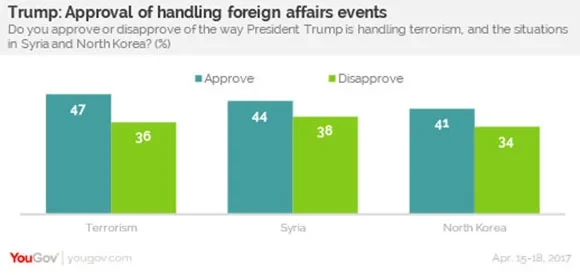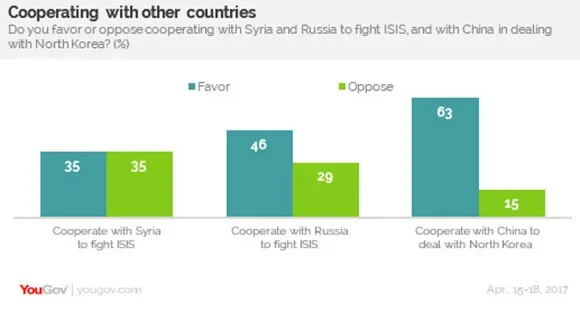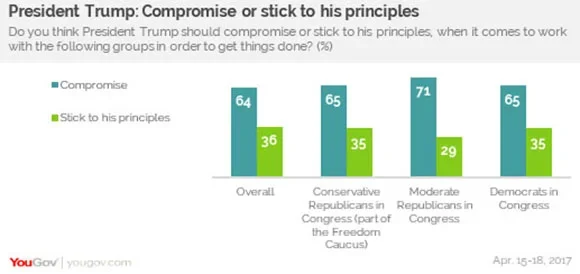64% of Americans want a President to compromise in order to get things done
Donald Trump may be shifting his positions on some issues – but many expected that would be the case even at the beginning of his Administration. Trump’s shifts may be in the direction the public likes: his highest approval ratings in the latest Economist/YouGov Poll come on his handling of terrorism, Syria and North Korea- aggressive stands that many Americans approve of. But despite these positive assessments, the President’s overall approval rating remains where it has been pretty much from the start of his Presidency, with significantly more disapproving than approving.

Both Republicans and Democrats support an American military role, at least when the United States is asked for help by its allies. Majorities in both parties favor U.S. military assistance when requested. A plurality has a favorable view of NATO, and by three to one want to remain in that alliance. There are two big threats Americans see: 61% view ISIS as an immediate and serious threat. Half say the same thing about North Korea. However, there are limits to how much Americans want to work with some other countries to deal with those threats.
That is especially the case when it comes to working with Syria. Even though Americans view ISIS as an immediate and serious threat, only a third are willing to work with the Syrian government to fight ISIS. The public overwhelmingly holds an unfavorable view of Syria’s leader, Bashar al-Assad: only 7% are favorable, while eight times that percentage are not. Americans approve of the President’s decision to bomb a Syrian air force base in response to that government’s use of chemical weapons on its own people.

On the other hand, even though Americans don’t like Russian President Vladimir Putin (just 15% have a favorable view of him), they would cooperate with Russia in fighting ISIS. Democrats are divided on this, while Republicans favor working with Russia by more than two to one. But when it comes to judging the President’s handling of Russia, Americans are divided, with a tilt in the negative direction: 35% approve, 41% do not.
[Of course, there are still many with questions about the Administration’s relationship with Russia. By two to one, Americans want Congressional investigations into pre-Inaugural contacts between members of the Trump Administration and the Russian government, as well as into any Russian hacking of campaign emails before the election.]
The North Korean threat (which fewer see as immediate when compared with the current threat from ISIS) is one that Americans overwhelming want to work with China to solve. That’s true even though half the public has no opinion about Chinese Premier Xi Jipeng, and those with an opinion are generally unfavorable. 31% have an unfavorable view of Xi, and 18% are favorable. But Americans overwhelmingly want the U.S. to work with China in dealing with North Korea. North Korea’s leader, Kim Jong-un, is viewed even less positively than Assad: 7% have a favorable view of Kim, 71% are unfavorable.
The President gets positive marks when it comes to dealing with China, too. 42% approve, and 29% disapprove.
Changes in the President’s policy positions are not unexpected: prior to his Inauguration, the public already looked at Trump as changing his policy positions. Today, 41% see him as changing, and just 27% think he has consistent policy positions. But the appearance of compromise – and any attendant changes in position -- may be a good thing for this President.
By nearly two to one, Americans want a President to compromise in order to get things done. And they would be willing to have this President compromise with those within his party (both to the right and to the left of him) and those outside of it.

Just about two-thirds favor compromise with opposites: the conservative Freedom Caucus and Congressional Democrats. Slightly more favor compromise with moderate Republicans in Congress.
There is a partisan limit to compromise, however. When Republicans are asked whether or not President Trump should compromise with Congressional Democrats, they are less sure this should happen. A majority of Republicans (56%) say President Trump should stick to his principles and not compromise with Democrats. But nearly half of Republicans – 44% – are willing for him to compromise, even with the opposition.








